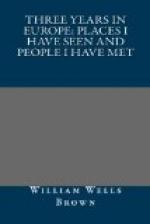The distance from Glasgow to Dundee is some seventy or eighty miles, and we passed through the finest country which I have seen in this portion of the Queen’s dominions. We passed through the old town of Stirling, which lies about thirty miles distant from Glasgow, and is a place much frequented by those who travel for pleasure. It is built on the brow of a hill, and the Castle from which it most probably derived its name, may be seen from a distance. Had it not been for a “professional” engagement the same evening at Dundee, I would most assuredly have halted to take a look at the old building.
The Castle is situated or built on an isolated rock, which seems as if Nature had thrown it there for that purpose. It was once the retreat of the Scottish Kings, and famous for its historical associations. Here the “Lady of the Lake,” with the magic ring, sought the monarch to intercede for her father; here James II. murdered the Earl of Douglas; here the beautiful but unfortunate Mary was made Queen; and here John Knox, the Reformer, preached the coronation sermon of James VI. The Castle Hill rises from the valley of the Forth, and makes an imposing and picturesque appearance. The windings of the noble river till lost in the distance, present pleasing contrasts, scarcely to be surpassed.
The speed of our train, after passing Stirling, brought before us, in quick succession, a number of fine valleys and farm houses. Every spot seemed to have been arrayed by Nature for the reception of the cottage of some happy family. During this ride, we passed many sites where the lawns were made, the terraces defined and levelled, the groves tastefully clumped, the ancient trees, though small when compared to our great forest oaks, were beautifully sprinkled here and there, and in everything the labour of art seemed to have been anticipated by Nature. Cincinnatus could not have selected a prettier situation for a farm, than some which presented themselves, during this delightful journey. At last we arrived at the place of our destination, where our friends were in waiting for us.
As I have already forwarded to you a paper containing an account of the Dundee meeting, I shall leave you to judge from these reports the character of the demonstration. Yet I must mention a fact or two connected with our first evening’s visit to this town. A few hours after our arrival in the place, we were called upon by a gentleman whose name is known wherever the English language is spoken—one whose name is on the tongue of every student and school-boy in this country and America, and what lives upon their lips will live and be loved for ever.




